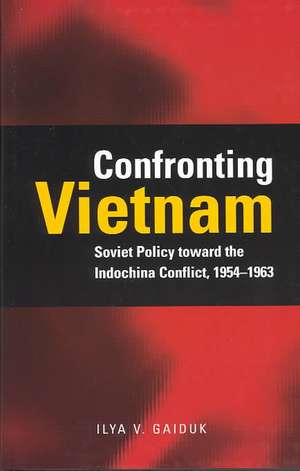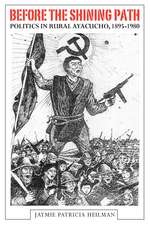Confronting Vietnam: Soviet Policy toward the Indochina Conflict, 1954-1963: Cold War International History Project
Autor Ilya Gaiduken Limba Engleză Hardback – 18 mar 2003
Based on extensive research in the Russian archives, this book examines the Soviet approach to the Vietnam conflict between the 1954 Geneva conference on Indochina and late 1963, when the overthrow of the South Vietnamese president Ngo Dinh Diem and the assassination of John F. Kennedy radically transformed the conflict.
The author finds that the USSR attributed no geostrategic importance to Indochina and did not want the crisis there to disrupt détente. The Russians had high hopes that the Geneva accords would bring years of peace in the region. Gradually disillusioned, they tried to strengthen North Vietnam, but would not support unification of North and South. By the early 1960s, however, they felt obliged to counter the American embrace of an aggressively anti-Communist regime in South Vietnam and the hostility of its former ally, the People's Republic of China. Finally, Moscow decided to disengage from Vietnam, disappointed that its efforts to avert an international crisis there had failed.
The author finds that the USSR attributed no geostrategic importance to Indochina and did not want the crisis there to disrupt détente. The Russians had high hopes that the Geneva accords would bring years of peace in the region. Gradually disillusioned, they tried to strengthen North Vietnam, but would not support unification of North and South. By the early 1960s, however, they felt obliged to counter the American embrace of an aggressively anti-Communist regime in South Vietnam and the hostility of its former ally, the People's Republic of China. Finally, Moscow decided to disengage from Vietnam, disappointed that its efforts to avert an international crisis there had failed.
Din seria Cold War International History Project
-
 Preț: 139.41 lei
Preț: 139.41 lei -
 Preț: 336.87 lei
Preț: 336.87 lei -
 Preț: 262.82 lei
Preț: 262.82 lei -
 Preț: 338.91 lei
Preț: 338.91 lei -
 Preț: 199.15 lei
Preț: 199.15 lei - 19%
 Preț: 449.76 lei
Preț: 449.76 lei -
 Preț: 246.14 lei
Preț: 246.14 lei - 19%
 Preț: 456.29 lei
Preț: 456.29 lei - 19%
 Preț: 546.91 lei
Preț: 546.91 lei - 19%
 Preț: 488.12 lei
Preț: 488.12 lei - 19%
 Preț: 454.26 lei
Preț: 454.26 lei - 19%
 Preț: 454.14 lei
Preț: 454.14 lei -
 Preț: 292.33 lei
Preț: 292.33 lei - 19%
 Preț: 451.93 lei
Preț: 451.93 lei - 19%
 Preț: 482.97 lei
Preț: 482.97 lei - 19%
 Preț: 451.13 lei
Preț: 451.13 lei -
 Preț: 336.63 lei
Preț: 336.63 lei - 19%
 Preț: 455.98 lei
Preț: 455.98 lei - 19%
 Preț: 457.39 lei
Preț: 457.39 lei - 19%
 Preț: 451.86 lei
Preț: 451.86 lei
Preț: 457.88 lei
Preț vechi: 538.68 lei
-15% Nou
Puncte Express: 687
Preț estimativ în valută:
87.61€ • 91.72$ • 72.50£
87.61€ • 91.72$ • 72.50£
Carte disponibilă
Livrare economică 17-31 martie
Preluare comenzi: 021 569.72.76
Specificații
ISBN-13: 9780804747127
ISBN-10: 0804747121
Pagini: 296
Dimensiuni: 152 x 229 x 25 mm
Greutate: 0.65 kg
Ediția:1
Editura: Stanford University Press
Colecția Stanford University Press
Seria Cold War International History Project
ISBN-10: 0804747121
Pagini: 296
Dimensiuni: 152 x 229 x 25 mm
Greutate: 0.65 kg
Ediția:1
Editura: Stanford University Press
Colecția Stanford University Press
Seria Cold War International History Project
Recenzii
"...the book is excellent, well researched and written, providing a perceptive analysis of this complicated crisis."—The International History Review
" . . . Gaiduk's clearly written and well-researched study is a rich and substantial contribution to the literature of the Vietnam War."—Journal of Asian Studies
Notă biografică
Ilya Gaiduk is Senior Research Fellow at the Institute of General History, Russian Academy of Sciences, Moscow.
Textul de pe ultima copertă
“...the book is excellent, well researched and written, providing a perceptive analysis of this complicated crisis.”—The International History Review
“ . . . Gaiduk’s clearly written and well-researched study is a rich and substantial contribution to the literature of the Vietnam War.”—Journal of Asian Studies
“ . . . Gaiduk’s clearly written and well-researched study is a rich and substantial contribution to the literature of the Vietnam War.”—Journal of Asian Studies
Descriere
Based on extensive research in the Russian archives, this book examines the Soviet approach to the Vietnam conflict between the 1954 Geneva conference on Indochina and late 1963, when the overthrow of the South Vietnamese president Ngo Dinh Diem and the assassination of John F. Kennedy radically transformed the conflict.




















